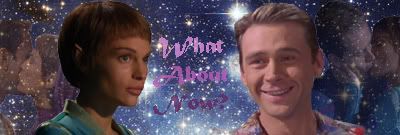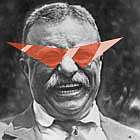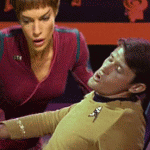Rigil Kent wrote:The argument also doesn't hold up when you look at the numbers. Modern Trek began its ratings decline with DS9, so arguing that introducing more characters instead of focusing on the ones you have doesn't track.
The problem is plain and simple: exceedingly poor writing in the first two (or three, depending upon your perception) seasons that failed to capture the attention of the viewing audience, characters who were, unfortunately, all too often nothing more than stereotypes (the "maverick commander", the "alien observer who doesn't understand humanity" who, as it happens, is also the "ship's babe", the "engineer with an accent" who, as it happens, was also the "good ole boy from the South", the "stuffy Brit", etc.), and, of course, exceedingly poor support (which is the same as hostility) from the Network.
JMHO
ETA: Reference to the inane ship's babe.
I agree completely with your second paragraph. In the first, however, there's more than one variable involved in DS9 and/or modern Trek's ratings decline, so it is still possible (it would require more detailed analysis and probably polling) that the wealth of characters contributed ratings where fewer characters would have led to an even more rapid ratings decline. I'm just saying that from the available data it is impossible to isolate whether or not the number of charactes on DS9 led to, or staved off, rapid ratings decline. A lot of people thought the ratings decline was in general due to just having two series' on TV and that it divided the fanbase. It stands to reason, since you'll find plenty of bread and butter Star Trek fans who loved one or the other but did not watch the remaining one much, i.e., loved DS9 and never watched Voyager or visa versa. I know many people around here think Voyager was about the worst thign that ever happened to Star Trek, but there ARE quite a few die hard fans of it out there, so those people who were watching Voyager and not DS9, does not necessarily reflect that DS9 was a poorer show, simply that they liked any number of aspects of Voyager more. But you're right, there is something to wonder about when it comes to modern Trek's ratings decline. I think TNG was just so new that it garnered a lot of interest. I wouldn't be surprised if a lot of the TOS crowd that came whooping and hollering with glee, turned around, disappointed with TNG and were not fans of the subsequent series. It's been my experience that there's a pretty prevalent elitism attitude among some TOS fans at conventions and stuff.
A quick note on the military matter: I knew there was a reason it seemed wrong to have a Major in charge of so few guys. But you said it was a higher rank than you'd see out in the field except maybe under SF circumstances, but I can think of two examples where that rank or higher was in combat (that weren't SF): one was that General James Mattis (USMC) was actually on the ground with the 1/1 in Afghanistan in 2001/2, the other is Major Doug Zembiec (USMC) who was killed in combat in Baghdad this year. I'm not trying to praise the Marine Corps or anything, but asking an honest question, is this more common in the Marines, for high level officers to be in the field? Or are these isolated examples?
Rigil Kent wrote: Which leads back to the very obvious intent of the execs to make the MACOs a "Special Forces" (which they obviously weren't), in which case, they would be split up differently than platoon elements (specifically, several A Teams and a single B Team).
I can't help but to point out that we're using modern US Navy/Marine Corps as a basis when it's pretty clear that UESPA Starfleet is very much not based on those templates in any incarnation of Trek (but especially ENT & TOS).
Not always, at least not in the Marines. Reconnassaince Bn's are separated into platoon elements. But if I am correct, the A team and B team thing is from Army SF and Delta, right? In the Army SF sense, you'd be correct. And the only reason I'm referring to the modern USN/USMC is because if we don't refer to ANYTHING, then we have no basis to go from, and there's no discussion to be had at all about it really, because anyone's opinion on the matter is as accurate as anybody else's. There's no right answer in that situation. And Starfleet/UES doesn't seem to resemble anything else, so it seems a good a choice as any. BSG's certainly a lot more adherant to maritime style, of course.
JadziaKathryn wrote:Elessar wrote:One of my biggest complaints with Enterprise and why it didn't BUILD the Trekkie fanbase but rather just held onto the fanatics in most cases (like us!) was because all the characters were, at least at first, squeaky-clean. Nobody had a dark side, which I know isn't Trek's style, but even B'Elanna had a dark side. Lon Suder was probably THE MOST INTERESTING character of Voyager, for that reason. Malcolm's S31 history made him so much more interesting, but his squeaky-cleanness from the first 4 years made it, frankly, a little hard for me to swallow for him. I liked it, but the character should have been written a little darker from the outset, a little less PBS-certified, to make that flow better. Same with Travis, imo that's what made him so bad, not just that he had no lines. That he was so 1-D.
I don't think you have to get into a deep, dark, tortured past to have a great character. Trip, for instance, is pretty "squeaky clean" BUT wasn't a flat character. I would've liked to have seen more of that.
I don't think I'd call Trip squeaky clean though. He had what amounted to, in a space-oriented culture, the 22nd century version of a little bit of xenophobia and certainly more than a healthy attitude of provincialism when it came to judging alien cultures. He certainly got over that for the most part, but it's definitely a part of his character. We also saw a dark side of the way he deals with loss... Trip's the kind of guy I could see becoming an alcoholic if he didn't have the right friends around him when something bad happened.
It's the 1-dimensionality that makes characters boring to me... And I guess one of their multiple dimensions doesn't HAVE to be evil-ness or darkness, but every example of a compelling, multidimensional character I can think of IS like that.











